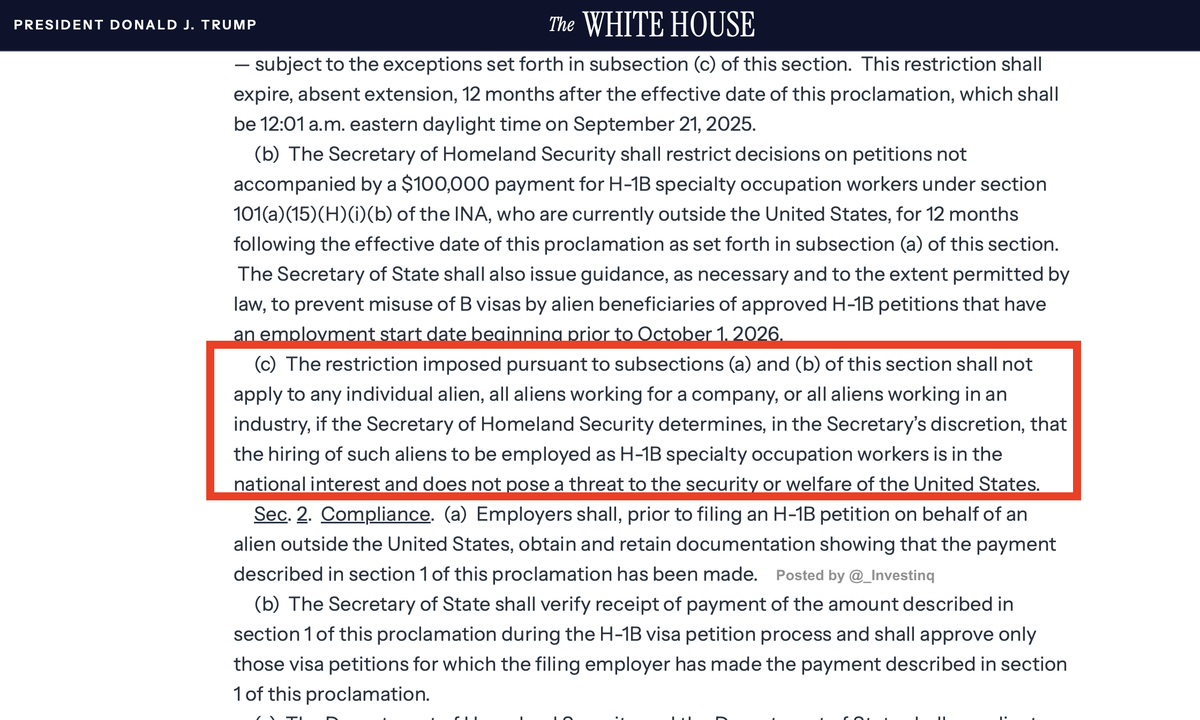
特朗普政府对 H-1B 签证征收每年 10 万美元费用的决定引发了公司员工和外国政府的强烈反对。该计划原本旨在引进高技能工人以加强美国经济,但多年来经常被用来用更便宜的外国劳动力取代美国人。这种转变压低了工资,排挤了合格的员工,并引发了经济担忧。费用增长令人震惊。曾经花费约 1 万美元的签证现在费用增加了十倍。拥有超过 11,000 名 H-1B 员工的亚马逊,如果适用于所有持有者,将面临近 10 亿美元的额外费用。在强烈反对后,政府将规则限制在新申请人,但最大的签证用户每年仍将面临数十亿美元的新成本。
这一举措是在长期依赖外国 STEM 劳动力的基础上增加的。2000 年至 2019 年间,美国的外国 STEM 工人数量从 120 万增加到近 250 万。在计算机和数学工作中,他们在劳动力中的比例从 17.7% 上升到 26.1%。IT 外包公司推动了这一转变的大部分,其 H-1B 工人的比例从 2003 年的约三分之一上升到近年来的三分之二以上。一项研究发现,H-1B 初级雇员的成本比雇佣美国人低 36%,这鼓励公司关闭部门,解雇美国员工,并引进成本更低的外国工人。这种影响尤其严重地打击了年轻的美国人。最近的计算机科学毕业生失业率超过 6%,而计算机工程毕业生的失业率超过 7%,高于许多非 STEM 专业。计算机职业的总体失业率从 2019 年的不到 2% 上升到 2025 年的略高于 3%。与此同时,公司继续削减美国工作岗位,同时获得数千个新签证。一家公司在同一年解雇了 15,000 名员工,同时获得了 5,000 个 H-1B 签证。另一家公司在俄勒冈州削减了 2,400 个工作岗位,同时引进了 1,700 名 H-1B 工人。许多被解雇的美国人甚至在离职前被迫在保密协议下培训他们的替代者。
新费用在公司内部造成了混乱。微软、谷歌和 Infosys 等科技巨头急于在规则生效前将海外员工带回,造成了混乱和项目延误。初创公司的情况更糟,尽管依赖专业的外国人才,但缺乏财务灵活性来承担如此高的成本。外交紧张也在加剧。印度是 H-1B 工人的最大来源国,强烈反对这一政策,指出家庭破裂和项目停滞。在两国努力深化经济伙伴关系的时候,这一政策增加了美印贸易关系的摩擦。
该公告中一个被忽视但关键的部分是自由裁量权。国土安全部长有权为特定的个人、公司或行业免除 10 万美元的费用,如果他们的工作被认为符合国家利益。这实际上将看似严格的规则变成了可以选择性应用的规则,引发了关于谁将在什么情况下获得豁免的问题。政府将政策描述为对美国工人,尤其是年轻求职者的保护,20-24 岁人群的失业率为 8.1%,但风险显而易见。更高的成本可能迫使公司将工作外包,延迟项目或削减投资。该政策可能不会增加美国人的机会,反而会减缓创新,削弱增长,并增加整个经济的成本。
来源:StockMarket.News
本文版权归属原作者/机构所有。
当前内容仅代表作者观点,与本平台立场无关。内容仅供投资者参考,亦不构成任何投资建议。如对本平台提供的内容服务有任何疑问或建议,请联系我们。


